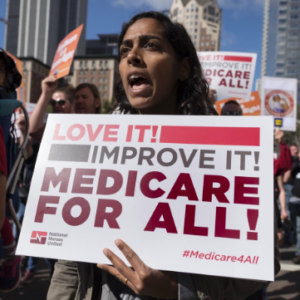So far in his campaign for president, Democratic nominee Joe Biden has assiduously avoided endorsing Medicare for All — much to the chagrin of a growing number of Democrats.
A recent Hill-HarrisX poll finds that 87 percent of Democrats favor Medicare for All. And numerous delegates to the convention voted against the Democratic platform because it didn’t call for a federal takeover of the country’s health insurance system.
But don’t be fooled. This intraparty squabble is more a matter of style than substance. Biden might present himself as an opponent of Medicare for All. But his policy proposals would pave the way for single-payer in the very near future, whether his fellow Democrats realize it or not.
Take the centerpiece of Biden’s healthcare agenda, the creation of a public health insurance option.
This new health plan would be administered by Centers for Medicare and Medicaid Services and available to all Americans, regardless of whether they have access to coverage through their jobs. Private insurers could compete with the public option for customers but would have no role in its administration.
Biden’s plan would keep costs down by systematically underpaying providers, just as Medicare does. Hospitals receive 87 cents from Medicare for every dollar of care they provide, according to the American Hospital Association.
Providers respond to these underpayments by charging private insurers more. Research from the RAND Corporation finds that private insurers pay hospitals, on average, 241 percent of Medicare’s rates.
Armed with this artificially low-cost structure, the public option would be able to offer cut-rate premiums. Biden’s plan even envisions a public option plan that has no premium and no deductible for certain low-income individuals.
Consequently, people would drop their private coverage and move to the public option. That would cause providers to raise rates for private insurers even more. Consumers would see those rate hikes in the form of higher premiums. And yet more people would flee to the public option.
Eventually, private insurers wouldn’t have any more customers. And the public option would be the only option. We’d have Medicare for All by default.
That the public option will inevitably collapse into single-payer helps explain why some of the most vocal advocates of Medicare for All have signed onto Biden’s policy vision. His healthcare task force included notable single-payer absolutists like Rep. Pramila Jayapal (D-Wash.) and Donald Berwick, who headed the Centers for Medicare and Medicaid Services during the Obama administration.
Even Bernie Sanders, who co-chaired Biden’s policy brain trust, has said he’s pleased with the body’s recommendations.
Has the Vermont socialist finally compromised on his signature policy issue? It’s far more likely that he sees the public option as a viable path to single-payer. Indeed, as Sanders said in a recent interview with CNN’s Jake Tapper, “We’re going to do everything that we can to elect Biden and — after he’s elected — move this country in as progressive a way as we possibly can.”
If anything, the fact that some Medicare for All partisans are unhappy with Biden’s agenda is evidence that his strategy is working as planned. Biden has done such a good job posing as a moderate this past year that he seems to have fooled even his own party.
If the Democratic presidential nominee succeeds in carrying off this ruse, millions of Americans will soon be stuck with a socialized healthcare system they never asked for.

